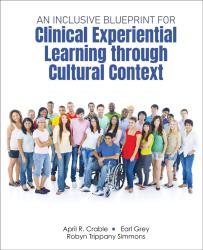An Inclusive Blueprint for Clinical Experiential Learning Through Cultural Context
Author(s): APRIL R. CRABLE , Earl Grey , Robyn T. Simmons
Edition: 1
Copyright: 2022
Edition: 1
Copyright: 2022
Choose Your Format
Choose Your Platform | Help Me Choose
Print Package
$137.81 USD
Powered by:
An Inclusive Blueprint for Clinical Experiential Learning Through Cultural Context collaboratively builds on the authors (59 years) collective experience preparing and supporting clinicians-in-training for their field experience.
This guide walks the student through practical elements of securing a site, meeting the field experience requirements, and preparing them to understand clinical and cultural aspects of working with clients. Further, this manual helps to prepare site supervisors for working with practicum and internship students, focusing on logistical and pragmatic issues as well as ethical and cultural considerations of supervision.
An Inclusive Blueprint for Clinical Experiential Learning Through Cultural Context is indeed a handbook which we believe clinicians-in-training and supervisors will consult as they navigate the process of clinical experiential training.
We are also excited to announce that accompanying this manual is an app which includes a virtual reality component for skills practice. The VR component, CliniVRSE, allows the clinician-in-training to practice skills in real time and allows the supervisor the ability to assess the session and progress of the supervisee on a later day and time.
- Fills the Gap in Asynchronous Skill Development
- is Customizable to your Course Needs
Preface
Authors
Part 1: For the Clinician-in-Training
1. Site Search
a. Creating a Resume and Cover Letter
b. The Interview
c. Interview Tips
d. Volunteering
e. Employment
f. Building Relationships
g. University Resources
h. Joining Associations
i. Qualifications of a Site Supervisor
j. Clinician-in-Training Responsibilities
k. Role Clarity
2. Capitalizing on the Experience
a. Direct Hours (Quantity and Quality)
b. Indirect Hours
c. Unexpected Events
d. Time Management
e. Self-Care
f. Work-Life Negotiation
3. Professional Identity
a. Experiential Learning Theory
b. Dispositions
c. Skill Acquisition
d. Skill Development
e. Application of Theory
f. Cultural Identity
g. Intersectionality
4. What Comes Next? (Graduate Experience)
a. Post-Graduation
b. Post-Graduate Supervision
c. Post-Graduate Supervisor
5. Special Considerations
a. Faith Integration
b. Distance Education-International Students
6. Reflection
Part 2: For the Supervisor
1. Supervisor Duties
a. Gatekeeping
b. Assessment
c. Client Care
2. Supervision Approach
a. Eligibility and Readiness
b. Models of Supervision
c. Theoretical Orientation
d. Cultural Identity
3. Digital Integration
a. Fit and Readiness
b. Preparation of the Clinician-in-Training
c. Tools
4. Special Considerations
a. Faith Integration
b. Supervising International Students
5. Reflection
Appendices
References
April Crable, Ph.D., MBA, LPC, SOTP, BC-TMH, received her B.A. in Criminal Justice from Old Dominion University, received her MBA from the University of Phoenix, and received her M.A. in Professional Counseling and Ph.D. in Counselor Education and Supervision from Regent University. Recently, Dr. Crable was selected as the Clinical Director of Practicum and Internship at Liberty University. Dr. Crable has worked in mental health for almost two decades, providing services to various populations. She has been a counselor educator for over a decade.
April Crable, Ph.D., MBA, LPC, SOTP, BC-TMH, received her B.A. in Criminal Justice from Old Dominion University, received her MBA from the University of Phoenix, and received her M.A. in Professional Counseling and Ph.D. in Counselor Education and Supervision from Regent University. Recently, Dr. Crable was selected as the Clinical Director of Practicum and Internship at Liberty University. Dr. Crable has worked in mental health for almost two decades, providing services to various populations. She has been a counselor educator for over a decade.
Dr. Crable is the owner of CCCDW, LLC which provides customized consulting recommendations and training designed to maximize the performance of individuals and organizations. She is the published author of several books and peer-reviewed articles in counseling journals. Dr. Crable has presented on the state, national, and international levels. She is also the co-founder of CliniVRSE, a virtual reality technology that develops learners’ expansive command of their clinical skills and decision-making while providing them with invivo feedback. Dr. Crable is an appointed member of CACREP’s Anti-Racism & Anti-Oppression Council and a professional reviewer for the Texas State Board of Examiners of Professional Counselors. She serves as an editor for Therapeutic Speakeasy Quarterly, a peer-reviewed eJournal. Dr. Crable specializes in teletherapy, crisis and trauma and counseling, substance abuse, ethics, and sex offender treatment.
Earl Grey has, over the past 25 years, held positions as a clinician, supervisor, and administrator in community mental health and addiction agencies, in addition to faculty, coordinator, director, and dean in digital counseling programs. Dr. Grey’s expertise includes regulatory accountability, academic administration, and experiential education across disciplines, complex trauma, dissociation, anti-racism, and neuroscience.
Robyn Trippany Simmons received her Ed.D. in Counselor Education from the University of Alabama in 2001 and has been a practicing counselor since 1996. She serves as Professor in the Department of Counseling at the University of the Cumberlands. Dr. Simmons has also served in programmatic administrative and leadership positions for much of her career. Dr. Simmons’s research and clinical interests include sexual trauma, vicarious trauma, play therapy, and professional identity issues. She is a Licensed Professional Counselor-Supervisor in Alabama and is a Registered Play Therapist Supervisor. Dr. Simmons publishes and presents locally, regionally, nationally, and internationally on play therapy, creative approaches to therapy and clinical supervision, counselor education, and trauma counseling.
Powered by:
An Inclusive Blueprint for Clinical Experiential Learning Through Cultural Context collaboratively builds on the authors (59 years) collective experience preparing and supporting clinicians-in-training for their field experience.
This guide walks the student through practical elements of securing a site, meeting the field experience requirements, and preparing them to understand clinical and cultural aspects of working with clients. Further, this manual helps to prepare site supervisors for working with practicum and internship students, focusing on logistical and pragmatic issues as well as ethical and cultural considerations of supervision.
An Inclusive Blueprint for Clinical Experiential Learning Through Cultural Context is indeed a handbook which we believe clinicians-in-training and supervisors will consult as they navigate the process of clinical experiential training.
We are also excited to announce that accompanying this manual is an app which includes a virtual reality component for skills practice. The VR component, CliniVRSE, allows the clinician-in-training to practice skills in real time and allows the supervisor the ability to assess the session and progress of the supervisee on a later day and time.
- Fills the Gap in Asynchronous Skill Development
- is Customizable to your Course Needs
Preface
Authors
Part 1: For the Clinician-in-Training
1. Site Search
a. Creating a Resume and Cover Letter
b. The Interview
c. Interview Tips
d. Volunteering
e. Employment
f. Building Relationships
g. University Resources
h. Joining Associations
i. Qualifications of a Site Supervisor
j. Clinician-in-Training Responsibilities
k. Role Clarity
2. Capitalizing on the Experience
a. Direct Hours (Quantity and Quality)
b. Indirect Hours
c. Unexpected Events
d. Time Management
e. Self-Care
f. Work-Life Negotiation
3. Professional Identity
a. Experiential Learning Theory
b. Dispositions
c. Skill Acquisition
d. Skill Development
e. Application of Theory
f. Cultural Identity
g. Intersectionality
4. What Comes Next? (Graduate Experience)
a. Post-Graduation
b. Post-Graduate Supervision
c. Post-Graduate Supervisor
5. Special Considerations
a. Faith Integration
b. Distance Education-International Students
6. Reflection
Part 2: For the Supervisor
1. Supervisor Duties
a. Gatekeeping
b. Assessment
c. Client Care
2. Supervision Approach
a. Eligibility and Readiness
b. Models of Supervision
c. Theoretical Orientation
d. Cultural Identity
3. Digital Integration
a. Fit and Readiness
b. Preparation of the Clinician-in-Training
c. Tools
4. Special Considerations
a. Faith Integration
b. Supervising International Students
5. Reflection
Appendices
References
April Crable, Ph.D., MBA, LPC, SOTP, BC-TMH, received her B.A. in Criminal Justice from Old Dominion University, received her MBA from the University of Phoenix, and received her M.A. in Professional Counseling and Ph.D. in Counselor Education and Supervision from Regent University. Recently, Dr. Crable was selected as the Clinical Director of Practicum and Internship at Liberty University. Dr. Crable has worked in mental health for almost two decades, providing services to various populations. She has been a counselor educator for over a decade.
April Crable, Ph.D., MBA, LPC, SOTP, BC-TMH, received her B.A. in Criminal Justice from Old Dominion University, received her MBA from the University of Phoenix, and received her M.A. in Professional Counseling and Ph.D. in Counselor Education and Supervision from Regent University. Recently, Dr. Crable was selected as the Clinical Director of Practicum and Internship at Liberty University. Dr. Crable has worked in mental health for almost two decades, providing services to various populations. She has been a counselor educator for over a decade.
Dr. Crable is the owner of CCCDW, LLC which provides customized consulting recommendations and training designed to maximize the performance of individuals and organizations. She is the published author of several books and peer-reviewed articles in counseling journals. Dr. Crable has presented on the state, national, and international levels. She is also the co-founder of CliniVRSE, a virtual reality technology that develops learners’ expansive command of their clinical skills and decision-making while providing them with invivo feedback. Dr. Crable is an appointed member of CACREP’s Anti-Racism & Anti-Oppression Council and a professional reviewer for the Texas State Board of Examiners of Professional Counselors. She serves as an editor for Therapeutic Speakeasy Quarterly, a peer-reviewed eJournal. Dr. Crable specializes in teletherapy, crisis and trauma and counseling, substance abuse, ethics, and sex offender treatment.
Earl Grey has, over the past 25 years, held positions as a clinician, supervisor, and administrator in community mental health and addiction agencies, in addition to faculty, coordinator, director, and dean in digital counseling programs. Dr. Grey’s expertise includes regulatory accountability, academic administration, and experiential education across disciplines, complex trauma, dissociation, anti-racism, and neuroscience.
Robyn Trippany Simmons received her Ed.D. in Counselor Education from the University of Alabama in 2001 and has been a practicing counselor since 1996. She serves as Professor in the Department of Counseling at the University of the Cumberlands. Dr. Simmons has also served in programmatic administrative and leadership positions for much of her career. Dr. Simmons’s research and clinical interests include sexual trauma, vicarious trauma, play therapy, and professional identity issues. She is a Licensed Professional Counselor-Supervisor in Alabama and is a Registered Play Therapist Supervisor. Dr. Simmons publishes and presents locally, regionally, nationally, and internationally on play therapy, creative approaches to therapy and clinical supervision, counselor education, and trauma counseling.




